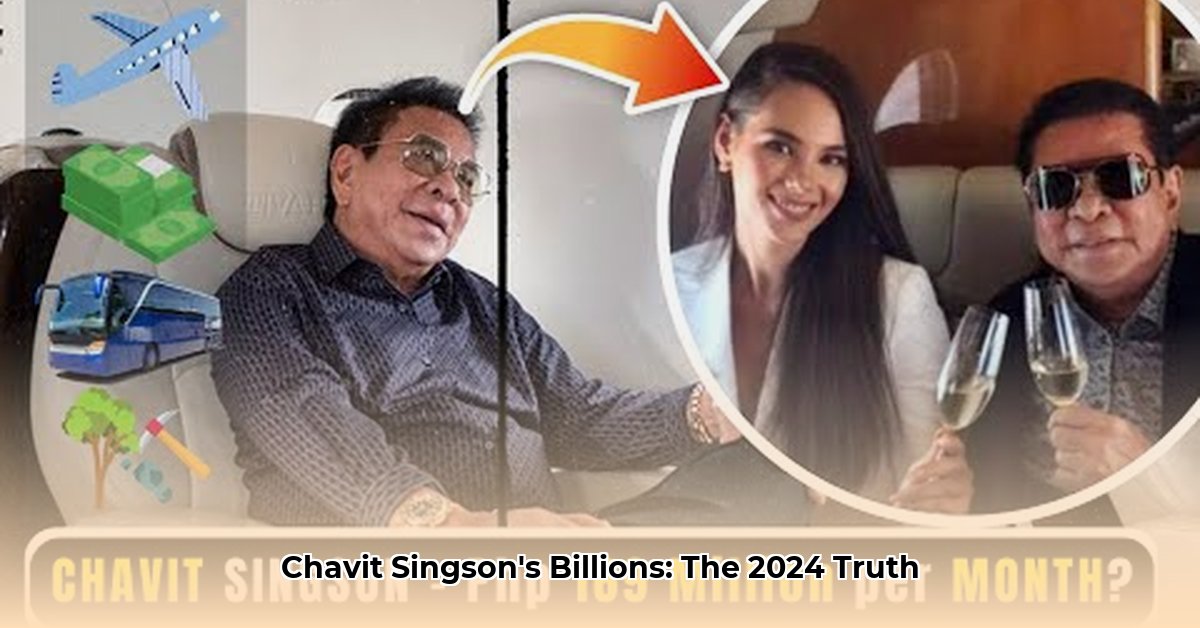
Chavit Singson Net Worth: Unpacking the Billionaire's Puzzle
Chavit Singson is a prominent figure in the Philippines, his name synonymous with wealth and influence. However, determining his precise net worth proves surprisingly challenging. While he's undoubtedly among the nation's wealthiest, obtaining a concrete figure resembles chasing a phantom. His business interests span diverse and often opaque sectors—from casinos and agriculture to less transparent ventures—making a comprehensive financial assessment nearly impossible. This article delves into the complexities of estimating Singson's wealth, exploring the challenges inherent in assessing the net worth of prominent Filipinos and the broader implications for the Philippine economy. For comparison, see Joey Salceda's net worth here.
Building an Empire: Singson's Business Ventures
Singson's journey to becoming a billionaire is a testament to entrepreneurial acumen and strategic business moves. His empire isn't built on a single foundation but rather a complex network of interconnected companies across various sectors. His early ventures laid the groundwork for future expansion, and strategic partnerships fueled his growth trajectory. He's prominently associated with the gaming industry, a sector widely believed to contribute significantly to his wealth. However, his business interests also encompass agriculture, real estate, and other less publicly known ventures. This diversification, combined with the prevalence of privately held companies in the Philippines, significantly hinders accurate net worth estimations.
But how do we even begin to assess such a sprawling portfolio? Imagine trying to value a massive, ancient tree; the main trunk is clearly visible and measurable (his publicly known businesses), but the countless branches, leaves, and hidden roots represent the obscured aspects of his business dealings – private companies, undisclosed investments, and less transparent financial transactions. A complete valuation demands examining every component, a near Herculean task given the opacity surrounding many privately-held Philippine businesses. Isn't it curious how such a significant figure's financial details remain relatively obscured?
The Net Worth Numbers Game: Why the Estimates Vary So Much
Reports vary wildly regarding Chavit Singson's net worth, with estimates ranging from hundreds of millions to billions of dollars. This discrepancy stems from the inherent difficulties in assessing privately held companies. Many Philippine businesses aren't obligated to publicly disclose detailed financial statements, creating a significant information gap. This lack of transparency is a major roadblock to accurate valuation. Consider this: if a company doesn't share its financial records, how can anyone truly gauge its worth?
Furthermore, a substantial portion of the Philippine economy operates within the informal sector, which generates significant wealth but remains largely undocumented. This complicates net worth calculations for individuals with interests in this sector, potentially including Singson. How can we possibly account for wealth generated and held within a system largely outside official channels? It's a crucial question when calculating the true net worth of a Filipino business magnate.
More Than Money: The Broader Impact of Singson's Wealth
Understanding Singson's net worth transcends simple curiosity; it has significant implications for the Philippine economy and society. His vast investments create jobs, stimulate economic growth within specific sectors, and influence the broader economic landscape. However, such concentrated wealth also raises concerns about economic inequality. How does his immense wealth compare to the average Filipino's income? What are the societal consequences of such a disparity? These questions demand further investigation.
His influence reaches far beyond simple economic metrics. His investments, network of contacts, and political connections significantly shape the socio-economic landscape of the Philippines. Does this concentration of power benefit all citizens equally? It’s a question worth pondering.
The Need for Transparency: A Crucial Step Forward
The difficulties in accurately assessing Singson's net worth, and that of other influential Filipinos, underscore the need for greater transparency within the Philippine business world. This isn't merely about satisfying public curiosity; it's about promoting fairness, accountability, and responsible governance. Increased transparency fosters trust, facilitates better policy-making, and enables more effective economic planning. Imagine a scenario where all businesses, regardless of size, are obligated to provide transparent financial information—it would revolutionize our understanding of wealth distribution and enhance economic planning considerably.
Confronting the Challenges, Embracing the Opportunities
The task of accurately assessing the net worth of individuals like Chavit Singson presents significant challenges, but also opportunities for improvement.
| Challenge | Opportunity |
|---|---|
| Limited public data on private holdings | Stronger regulatory frameworks mandating increased financial disclosure |
| Informal economy's influence | Developing sophisticated methodologies for capturing wealth generated in this sector |
| Inconsistent net worth estimates | Refining methodologies for more precise wealth assessments across various assets |
Addressing these issues isn't solely about scrutinizing specific individuals; it's about building a more robust, equitable economic system for all Filipinos. The path forward requires a multi-faceted approach: stronger regulations, innovative data collection techniques, and a cultural shift towards greater transparency. Until then, the precise figure for Chavit Singson’s net worth will likely remain an intriguing, yet elusive, puzzle. But the pursuit of greater transparency within the Philippine economy is a journey undeniably worth taking.